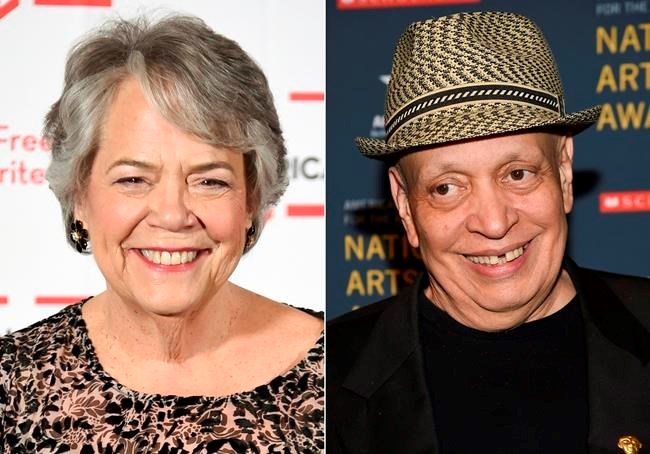NEW YORK — Stories of race, class and climate change were among the fiction finalists Tuesday for the 71st annual National Book Awards.
The National Book Foundation, which presents the awards, announced five works in each of five categories: fiction, nonfiction, poetry, translation and young people's literature. None of the authors have been finalists before, although novelist Lydia Millet has been on the fiction longlist of 10. Eight of the finalists were cited for their debut work.
In paring the categories from last month's longlists, judges left off some of the year's most talked about books, including Brit Bennett's novel “The Vanishing Half” and Isabel Wilkerson's history of racism in the U.S., “Caste.” Two of the so-called “Big Five” publishers were shut out entirely: Hachette Book Group and Simon & Schuster, although an honorary award will be given posthumously to Simon & Schuster CEO Carolyn Reidy, who died in May.
Millet's “A Children's Bible” tells of a group of young people left to confront environmental disaster while the adults turn away. Other books in the fiction category include Deesha Philyaw's multigenerational story of Black women “The Secret Lives of Church Ladies,” Rumaan Alam's subtle and terrifying “Leave the World Behind," Douglas Stuart's working class family saga “Shuggie Bain,” and Charles Yu's satire of stereotypes and Hollywood, “Interior Chinatown."
In nonfiction, “The Dead Are Arising” marks the second time in the past decade that a Malcolm X biographer was posthumously cited by awards judges. In 2011, Manning Marable died just before the release of “Malcolm X: A Life of Reinvention,” a National Book Award finalist and winner of the Pulitzer Prize. “The Dead Are Arising” was co-authored by Tamara Payne and her father Les Payne, the Pulitzer Prize-winning journalist who died in 2018.
Nonfiction nominees also include Karla Cornejo Villavicencio's “The Undocumented Americans,” Claudio Saunt's “Unworthy Republic: The Dispossession of Native Americans and the Road to Indian Territory," Jenn Shapland's “My Autobiography of Carson McCullers” and Jerald Walker's “How to Make a Slave and Other Essays.”
The poetry finalists are Mei-mei Berssenbrugge's “A Treatise on Stars,” Tommye Blount's “Fantasia for the Man in Blue,” Don Mee Choi's “DMZ Colony," Anthony Cody's “Borderland Apocrypha” and Natalie Diaz's “Postcolonial Love Poem.”
In translation, the finalists are Anja Kampmann for “High as the Waters Rise,” translated from the German by Anne Posten; Jonas Hassen Khemiri's “The Family Clause,” translated from the Swedish by Alice Menzies; Yu Miri's “Tokyo Ueno Station,” translated from the Japanese by Morgan Giles; Pilar Quintana's “The Bitch,” translated from the Spanish by Lisa Dillman; and Adania Shibli's “Minor Detail,” translated from the Arabic by Elisabeth Jaquette.
Finalists for young people's literature are Kacen Callender's “King and the Dragonflies," Traci Chee's ”We Are Not Free," Candice Iloh's “Every Body Looking," Victoria Jamieson and Omar Mohamed's “When Stars Are Scattered,” and Gabriel Savit's “The Way Back.”
Winners in each of the competitive categories receive $10,000, with the money divided equally between the author and translator for best translated book. Judging panels of authors, critics and others in the bookselling community selected finalists from nearly 1,700 books submitted by publishers.
Winners will be announced during an online ceremony Nov. 18, with honorary medals to be presented to Reidy and to author Walter Mosley.
Hillel Italie, The Associated Press



